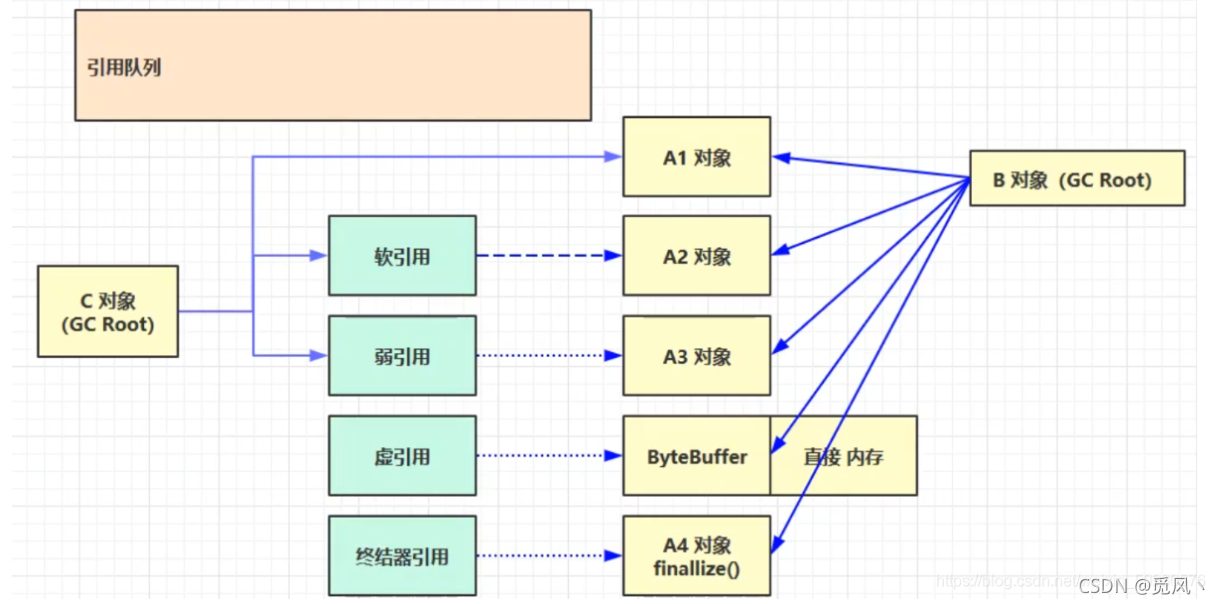JVM学习笔记02:垃圾回收
垃圾回收
如何判断垃圾是否可以回收
1:引用计数法
当一个对象被引用时,就当引用对象的值加一,当值为 0 时,就表示该对象不被引用,可以被垃圾收集器回收。
这个引用计数法听起来不错,但是有一个弊端,如下图所示,循环引用时,两个对象的计数都为1,导致两个对象都无法被释放。
 2:可达性分析算法
2:可达性分析算法
- JVM 中的垃圾回收器通过可达性分析来探索所有存活的对象
- 扫描堆中的对象,看能否沿着 GC Root 对象为起点的引用链找到该对象,如果找不到,则表示可以回收
- 可以作为 GC Root 的对象
- 虚拟机栈(栈帧中的本地变量表)中引用的对象。
- 方法区中类静态属性引用的对象
- 方法区中常量引用的对象
- 本地方法栈中 JNI(即一般说的Native方法)引用的对象
public static void main(String[] args) throws IOException {
ArrayList<Object> list = new ArrayList<>();
list.add("a");
list.add("b");
list.add(1);
System.out.println(1);
System.in.read();
list = null;
System.out.println(2);
System.in.read();
System.out.println("end");
}
引用类型

- 强引用
只有所有 GC Roots 对象都不通过【强引用】引用该对象,该对象才能被垃圾回收 - 软引用(SoftReference)
仅有软引用引用该对象时,在垃圾回收后,内存仍不足时会再次出发垃圾回收,回收软引用对象
可以配合引用队列来释放软引用自身 - 弱引用(WeakReference)
仅有弱引用引用该对象时,在垃圾回收时,无论内存是否充足,都会回收弱引用对象
可以配合引用队列来释放弱引用自身 - 虚引用(PhantomReference)
必须配合引用队列使用,主要配合 ByteBuffer 使用,被引用对象回收时,会将虚引用入队,
由 Reference Handler 线程调用虚引用相关方法释放直接内存 - 终结器引用(FinalReference)
无需手动编码,但其内部配合引用队列使用,在垃圾回收时,终结器引用入队(被引用对象暂时没有被回收),再由 Finalizer 线程通过终结器引用找到被引用对象并调用它的 finalize 方法,第二次 GC 时才能回收被引用对象。
演示弱引用
/**
* 演示 软引用
* -Xmx20m -XX:+PrintGCDetails -verbose:gc
*/
public class Code_08_SoftReferenceTest {
public static int _4MB = 4 * 1024 * 1024;
public static void main(String[] args) throws IOException {
method2();
}
// 设置 -Xmx20m , 演示堆内存不足,
public static void method1() throws IOException {
ArrayList<byte[]> list = new ArrayList<>();
for(int i = 0; i < 5; i++) {
list.add(new byte[_4MB]);
}
System.in.read();
}
// 演示 软引用
public static void method2() throws IOException {
ArrayList<SoftReference<byte[]>> list = new ArrayList<>();
for(int i = 0; i < 5; i++) {
SoftReference<byte[]> ref = new SoftReference<>(new byte[_4MB]);
System.out.println(ref.get());
list.add(ref);
System.out.println(list.size());
}
System.out.println("循环结束:" + list.size());
for(SoftReference<byte[]> ref : list) {
System.out.println(ref.get());
}
}
}
method1 方法解析: 首先会设置一个堆内存的大小为 20m,然后运行 mehtod1 方法,会抛异常,堆内存不足,因为 mehtod1
中的 list 都是强引用。
method2 方法解析:在 list 集合中存放了 软引用对象,当内存不足时,会触发 full gc,将软引用的对象回收。
上面的代码中,当软引用引用的对象被回收了,但是软引用还存在,所以,一般软引用需要搭配一个引用队列一起使用。
修改 method2
// 演示 软引用 搭配引用队列
public static void method3() throws IOException {
ArrayList<SoftReference<byte[]>> list = new ArrayList<>();
// 引用队列
ReferenceQueue<byte[]> queue = new ReferenceQueue<>();
for(int i = 0; i < 5; i++) {
// 关联了引用队列,当软引用所关联的 byte[] 被回收时,软引用自己会加入到 queue 中去
SoftReference<byte[]> ref = new SoftReference<>(new byte[_4MB], queue);
System.out.println(ref.get());
list.add(ref);
System.out.println(list.size());
}
// 从队列中获取无用的 软引用对象,并移除
Reference<? extends byte[]> poll = queue.poll();
while(poll != null) {
list.remove(poll);
poll = queue.poll();
}
System.out.println("=====================");
for(SoftReference<byte[]> ref : list) {
System.out.println(ref.get());
}
}


